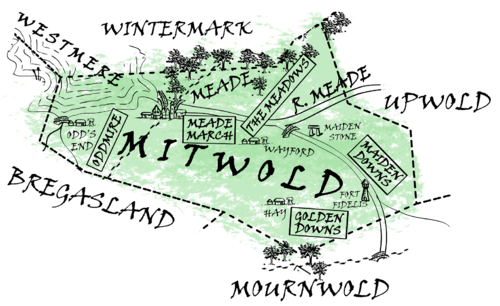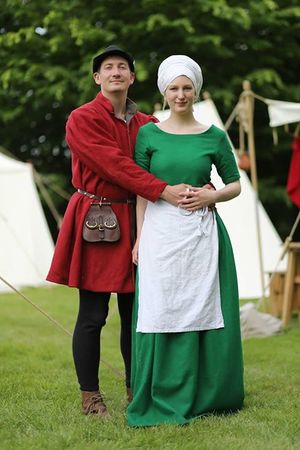Mitwold
Overview - "The Pride of the Marches"
More than in Upwold or Bregasland, the households of Mitwold engage in feuding and bitter rivalry. The closer two households are to one another in Mitwold, the more likely it is that they are engaged in a bitter feud. This is also the territory where many of the best known ball games are played, and it is a regular occurrence for some dispute to be settled by a savage game of rugby, football or rounders.
Mitwold's substantial coast, populated by small fishing villages along the shore, gives way to fertile chalk-soiled downs further inland, with rich game-filled woodland and larger farms and market towns beyond. There's gold in the soil of the north-western portion of the nation; the gold of summer's harvest.
Recent History
Shortly before the Spring Equinox 381YE, work was completed on a network of granaries and storehouses across Mitwold as part of the Imperial Breadbasket great work.
Major Features
Meade
The largest settlement in the Marches is the market town of Meade in Mitwold. Crowded around the mouth of the eponymous river on the shores of Westmere, Meade is not only the spiritual and administrative heart for the nation, it’s also a port whose ships deal in fishing, trade with foreign nations and sea defence against the barbarians through Westmere and the Gullet. It’s where Marchers from smaller towns often come to spend hard-earned coin, and more often than not plays host to exotic foreigners. The Harvest’s End Festival sees Meade filled with folk from all across the Empire, and it’s said that no-one sleeps there for a week.
In the wake of the death of Empress Britta in 376YE, semi-organised groups of bandits began to prey on traders traveling by land from Meade. By order of the Imperial Senate, in early 377YE a series of watchtowers and earthworks were constructed around Meade to help address this problem. The works were overseen by Bridget Eastville née Talbot (senator for Mitwold) as part of a larger plan to provide protection to towns throughout the Empire. While the defences are not sufficient to qualify Meade as a true fortification, they have already helped reduce brigandry throughout the territory.
The Bailiff of the Grand Market has a small office in Meade, although most title holders spend little time there (apart from to oversee the security of the grand market on the third weekend of each month). The Bailiff is an Imperial title auctioned each Winter Solstice through the Imperial Bourse that can be held by any citizen of the Marches.
Hay
“The golden fields of Hay” appear in many a Marcher song. Hay is quintessential Marches, a small rural town set amongst rolling fields. Over the last few years a number of those fields have been turned over to military camps, as the Imperial army keeps a close watch on the barbarians in the Mourn. A number of locals have formed themselves into the Hay Irregulars, an unofficial force dedicated to helping turn back the barbarians so that Hay’s fields can be golden once more.
Wayford
A large market town at the confluence of the upper tributaries of the Meade. A layer of gritstone in between the chalk of the wolds means the river is wide and shallow, allowing livestock from the hills to cross, or embark on riverboats to Meade itself. At the river fork in Wayford stand several gibbets with a long and bloody history, notable in recent years for playing host to Red Walder and his outlaws, a plague on the Mitwold for many years. The town is also notable due to legends that the monstrous creature known variously as Jack-in-chains, Jack-of-Irons and Bloody Jack is buried somewhere nearby.
The Maiden Stone
An ancient dolmen that stands in a scorched area of land in a grove of ash trees. Every year before the Spring festival the farmers of the area weave the largest straw dolly known in the territories. The Straw Maiden, as the creation is known, is 12 feet tall adorned with wild flowers with intricate patterns of vines woven into her skirt. The Maiden’s skirt is hollow at the base and she is placed atop the dolmen. The landskeepers of the area then bless the Maiden in many nights of ritual. The Maiden then stands in the grove, visited by pilgrims who proffer food, trinkets and other offerings at her foot in the hope that she may bring them some small favour. This continues until the summer has ended. Mysteriously although the Maiden has been exposed to all weathers and temperaments, she does not rot, blow away or decay in any way, staying as fresh and brightly golden as the day she was placed upon the stone. Then, at the festival of Harvest there is another ceremony, the culmination of which sees the Maiden set alight, burning until there is nothing left.
Regions
Golden Downs
In 377YE the Imperial Master of Works approved the creation of Forte Fidelis in Golden Downs. This fortification was completed shortly before the Winter Solstice 378YE. (OOC Note: Forte Fidelis is a rank one fortification).
Maiden Downs
Meade March
Often called the heart of Mitwold, Meade March is the location of the city of Meade, built at the mouth of the river that shares its name.
Keywords: While Meade is a bustling port, the region of Meade March does not have the coastal quality - the river is easily navigable to trading ships, but is both too narrow and too shallow to allow passage to a navy. While the aldermen have occasionally discussed dredging the river to allow the construction of a shipyard, there has never been enough support for such a large-scale undertaking. Wiser heads also point out that while a shipyard might provide a suitable anchorage for a Marcher navy, it would also mean that Meade was placed at risk of being sacked by a barbarian navy, and that tends to end the argument.
The Meadows
Oddmire
When the Marchers first arrived in Mitwold, Oddmire was extremely marshy. Several decades of work reclaimed most of the region, despite the best efforts of angry marshwalkers to stop the draining of the swamps and marshes. There are still some treacherous bogs in Oddmire, especially along the southern and western borders with Bregasland, but the majority of the region is fertile farmland. As is traditional in the marches, there are large numbers of farms here, but there are also a few more isolated communities built on the small, rocky islands that lie along the southern shore of the Westmere. The most prominent settlement here is assuredly Odd’s End. A bustling fishing port with a chip on its shoulder against the larger Meade, the fisherfolk of Odd’s End pride themselves on being first out to the water, the banner of Odd - a leaping salmon - raised above the waves before their Meade brethren have untied from dock. A well-respected monastery dedicated to the followers of Pride stands near the port itself.
Keywords: Coastal
Odd of Odd's End is a popular folk hero from the early days of the Empire, born around 45YE. She was an outspoken devotee of the virtue of Pride, and in later life founded the monastery that still bears her name. Settling her folk on the shore when the Marchers first reached the Westmere, declaring that this would be the place where she would end her days, she was instrumental in the draining of Oddmire among other significant deeds. A series of stories, popular with Mitwold's mummers, recount the many deeds of this folk hero, especially her battles against marshwalkers, and her rivalry with the aldermen of Meade.
Despite her popularity, there has been no serious effort to have Odd recognised as an exemplar by the Imperial Synod. When the matter has been raised, the abbot of Odd's End generally shrugs and responds with a variant of "We know she's an exemplar, why should we look to outsiders to confirm it?"
OOC Notes
- All the regions of Mitwold are under Imperial control.
- Forte Fidelis in Golden Downs is a rank one fortification.
- * The Imperial Breadbasket great work gives every Marcher character who owns a farm a share of 100 rings.
Henry Talbot sat with his back to the tumbled wall of the burnt out homestead, sweat plastering his dark hair to his forehead.
The flush of vigorous life had faded from his cheeks during the escape from the barbarians, but mischief still sparked defiantly in his eyes. Sun beat down and wisps of steam made thin halos about their heads. "Nothing you could have done Ned. Thank the boys for carrying me all this way... How long do you think?"
" It could be an hour, or as short as you..."
Ned paused as he reached into his pouch of herbs. A decade of hunts made him grab instinctively for his pike, the mating cry of a Bregesland Dove in the wrong season could only mean one thing.
"Cullach-A-Cullach!" Sounded to the right, accompanied by a gurgling squeal. A moment later two Orc scouts and a human slave burst from the bushes in front of them. Ned brought the pike to bear, but not fast enough.
The smaller of the two orcs, face split with a recent wound, shoved the slave into the pike and drove her body onto the shaft. Ned drew his dagger, but the orcs were on him before the sword was free. Not relishing the prospect of a standing fight they rushed forward and bore Ned to the earth.
In a flash decision Ned dropped the dagger, grasping the wrist holding a rusty knife and breaking the nose of the second Orc. Broken Nose rolled away from the melee, streaming blood and curses, while Split Face and Ned struggled over the knife.
Suddenly Henry was stood astride Split Face, Ned's dagger in hand. With a butcher's confidence he sliced Split Face's neck to the bone, drenching Ned in ichor.
Ned held fast to the rusty knife, taking it from unresisting hands. As he cleared his eyes Ned heard Henry grunt and the tip of a blade emerged from his stomach. Henry toppled and Broken Nose stooped over the to pull the notched sword free.
Roaring in fury, Ned kicked Split Face's body off and launched himself forward. The notched sword was trapped and useless between them, allowing Ned free reign with the rusty knife...
Ham came to check on them once the rest of the orc scouts were disposed of. Ned sat beside the ashen body of Henry Talbot, truely still now that he had begun his journey through the labyrinth. The remains of a human and two orcs lay in the remains of the herb garden. Not a word passed between the Cullach, just a look and a nod.
With great care they removed Henry's harness and hid it up the chimney of the homestead, suspended from the meat smoking hooks. Ham took the small antler handled knife from Ned's shaking hand and cut Henry's warm heart free from his chest. Ned knelt and filled Henry's mouth with Marcher soil, replaced in the oiled pouch by the heart. They closed his eyes and pushed the remaining wall of the homestead over him.
The fallen stones would conceal him from desecration and keep him from scavengers. Now they had to move on, their burden heavier than a dying friend.
"Rest well Henry Talbot, your march is done."
